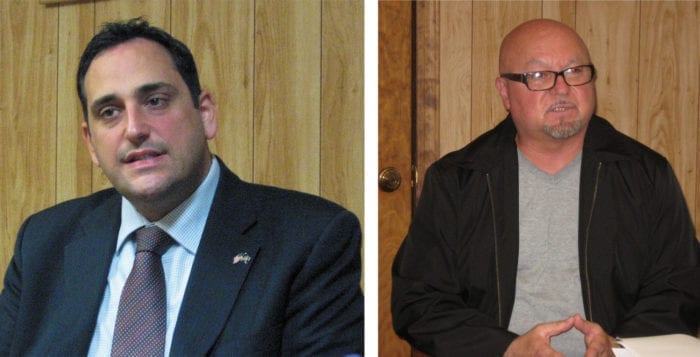Chad Lupinacci (R-Huntington Station) was first elected to represent New York’s 10th Assembly District in 2012, and Nov. 8 he’ll try for a third term against Democrat Ed Perez, a Huntington resident and a current member of the Suffolk County Board of Elections.
The two were interviewed at the TBR News Media main office ahead of Election Day to discuss the state of the 10th district, which covers in large part Huntington Town.
In addition to his duties with the board of elections, Perez is also the president of Diversity Resource Network, a marketing consulting organization. He identifies himself as a “social entrepreneur” because of his 25 years of experience in the nonprofit sector.
Lupinacci served on the school board of the South Huntington School district for eight years prior to his election in 2012. He’s a real estate attorney and an adjunct professor at Farmingdale State College, Hofstra University and St. Joseph’s College.
In his four years in the Assembly, Lupinacci has fought to cut taxes, make college more affordable and address the growing problem of addiction in the district. Perez has lived in the Huntington community for 23 years, and he said that has played a role in his desire to run.
“I care deeply about New York State and I care deeply about the Huntington community,” Perez said. He described some of the efforts he’d like to see to stimulate the district’s economy by upgrading the infrastructure in the community.
“We have a problem from Pulaski Road to Jericho Turnpike,” he said. “We have a strip there that has no sewers so that impedes development from investors to come in.”
Perez serves on the town’s zoning board of appeals.
“If we get the infrastructure of sewers going in, and it can be done in phases, we could get other types of businesses coming in,” he said. “Investors are not going to come in and invest in your community unless you have the sewers there.”
Lupinacci’s approach to stimulating the local economy focuses on higher education.
“A few years back we instituted a program that if you graduate in the top 20 percent of your high school class majoring in a STEM program, you can go to a SUNY or CUNY school for free as long as you’re staying five years in New York state afterwards,” the incumbent said. He said he’d like to see something similar done to funnel students toward community colleges. “We wanted to make sure that we would allow better tax credits for the students who are graduating and staying in New York afterwards because we want to give them an incentive to stay here.”
A central component of Lupinacci’s platform is to root out political corruption in the Assembly and across New York’s government. He helped to pass legislation to stop politicians found guilty of corruption from receiving taxpayer-funded pensions and said he plans to keep fighting in that direction.
“We need to make the Assembly more transparent in the coming years, and also limit outside income in terms of what legislators make,” Lupinacci said. He added he’d like to see Assembly committee meetings televised and term limits for all members.
The common ground in election oversight, and the claims of a “rigged” election made by Republican presidential nominee Donald Trump were addressed by both candidates.
“It is not a rigged system,” Perez said. “Nobody wants to go to jail because they’re not doing the appropriate thing at the board of elections.”
Lupinacci wouldn’t support his party’s nominee’s claims of an unfair system.
“I think our board of elections workers are great people and they’re very good on Long Island, but there are problems some times when the elections are very close,” he said. “We do have recounts and such [when elections are close]. Do I think the election is rigged? No.”
Violence has become an issue at the forefront of daily life in the district. The incumbent discussed some of what he’s done to combat the issue and some of his future plans.
“We’ve been working along with [New York State Sen. Carl Marcellino (R-Syosett)] and people in the community to increase cameras in the area, so not only in terms of actual police officers but more surveillance in the area to see what’s going on,” Lupinacci said. He added that community outreach programs and a stimulated economy could also help.
Perez commended Huntington Town Supervisor Frank Petrone (D) for increasing patrols by park rangers in town parks as a means to improve security in the community. He added that economic development and improvement of infrastructure could also help to reduce crime in the area.
“It’s about economic development and socioeconomic issues which makes kids sell drugs and get involved with gangs,” he said. “I think that looking at infrastructure is very important.”








































































